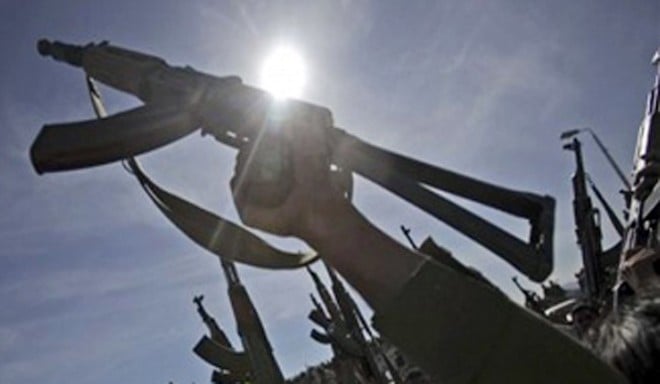

Over the past few months, several high-level dignitaries of Saudi Arabia, including Saudi Foreign Minister, Saud Al-Faisal and Crown Prince Salman bin Abdulaziz, who is Saudi Arabia’s deputy prime minister and defense minister, visited Pakistan. The Saudi prince met political and military leaderships. Before his trip to Pakistan, General Raheel Sharif, Pakistan’s Chief of Army Staff, made his maiden trip to Saudi Arabia after replacing General Ashfaq Parvez Kayani in November 2013. During his three-day visit, he is reported to have met the entire top Saudi military leadership.
Defense experts say Saudi Arabia’s close military ties with Pakistan, though not new, have now taken a new dimension -- getting Pakistan’s military support for rebels in Syria and countering the threat of a nuclear-capable Iran.
The joint statement issued at the end of Crown Prince Salman bin Abdulaziz’ visit also indicated that a major focus of the Saudis was to get maximum cooperation from Pakistan in the field of defence. "The two sides also agreed on the need to enhance bilateral cooperation in the field of defense," reads the joint statement.
Diplomatic sources in Islamabad say Saudi Arabia wants to transform itself as a regional military power as Saudis are disappointed by the US refusal to back Saudis’ efforts to overthrow the Bashar al-Assad regime in Syria and White House’s policy of rapprochement with Iran.
"The Sunni block of Arab states, which is led by Saudi Arabia, has been feeling insecure. Consequently, Pakistan has emerged as central to the Saudi strategy. It is true that Saudis are more interested in military cooperation. They are seeking Pakistani military arsenal like anti-aircraft and anti-tank missiles for possible use in Syria. They have also asked to depute personnel of Pakistani army in Saudi Arabia to train Saudi troops," says a diplomat who doesn’t want to be identified.
Sources say Arab states are also planning a major military exercise this year. "King of Bahrain’s visit to Pakistan was also in the same context. He visited the GHQ and sought more cooperation in the field of defense," the sources add.
They believe different stakeholders in Pakistan are being taken on board to take decisions on the requests of Saudi Arabia and Bahrain. It would not be easy to support Saudi Arabia and Bahrain outrightly as it would create problems in Pakistan. You have at least 15 per cent Shia population in Pakistan and they have good representation in the Pak army as well. Military leadership would have to take all grey areas into consideration, the sources say.
Diplomatic and military sources say a similar situation emerged in the late 1980s when Saudis asked General Zia to not depute Shia officers in the units sent for deployment in their country. "The suggestion was strongly opposed by then military leadership saying the move would damage cohesion of Pakistani forces," sources say, adding that such agreements cannot be implemented discreetly in the armed forces.
This is not the first time that Saudi Arabia has been looking towards Pakistani military for its internal and external security.
In the 1980s, during the Zia regime, Pakistan deployed one division troops in Saudi Arabia. The Pakistani division consisted of one infantry and one armored brigade. An armored brigade group of Pakistani troops was stationed there from 1982 to 1988.
Some diplomatic and security sources based in Islamabad confirm that Pakistan has agreed to supply anti-aircraft and anti-tank rockets to the Saudis. "They have given us guarantees that these weapons will not be used outside Saudi Arabia," they say.
They indicate that since direct military training may not be possible, Pakistanis may now train select Saudi groups, that will, in turn, provide guerilla training to rebels in Syria. "There are groups which, on the behest of Saudis, are recruiting retired army officials and people from Pakistan and sending them to Syria," sources say.
Dr Ayesha Siddiqa, an Islamabad-based security analyst, says the Pakistan Army has always been very close to the Arabs. "If you remember the US-Iraq conflict of 1991, the troops were sent to protect Saudi interests," she says, adding, "the money given by Saudi Arabia is to keep us engaged and away from the Iranian influence. Seeking Pakistan’s help in Syria is also important. I don’t think that Pakistan will be very vocal in supporting the Arab stance in Syria but sending irregular forces like the jihadis is definitely a possible objective."
Experts on military affairs and security say it is true that Saudis are demanding arms and troops and Sharif brothers would also like the army to respond to it. "It would not be easy for the army to provide the support the way Saudis want it. I do not know if something happens underhand. I think we should not indulge in this war. This is a mess. We have already seen what has been happening in Egypt," says Major General (retd), Athar Abbas, talking to TNS, adding, "They (the Saudis) have a space in the army and when you have a government like Sharifs the space becomes more open." But he does not think army would send troops to Syria. "The army has a very institutionalised decision-making process and would take all considerations into account before taking the decision," he says.